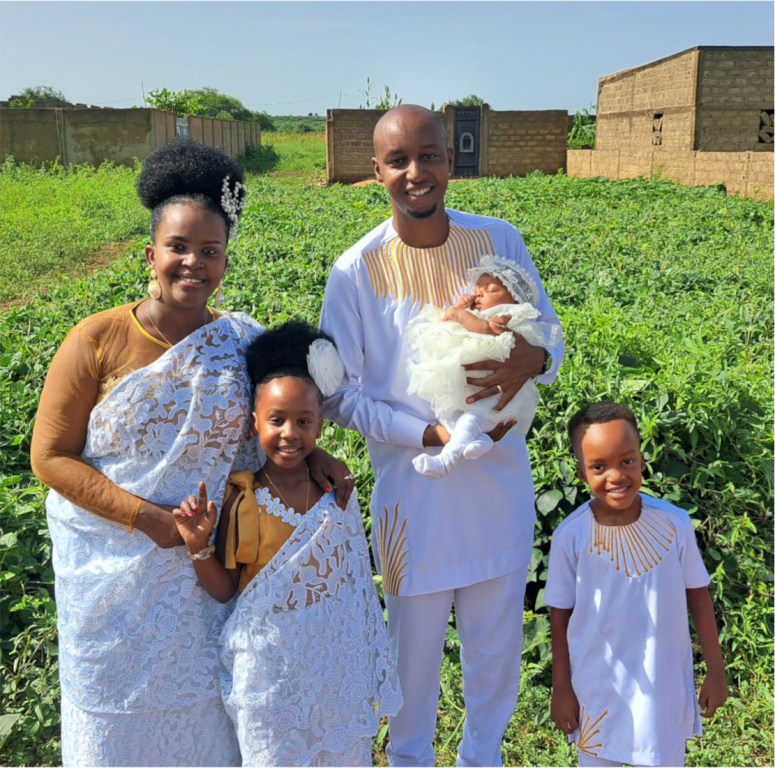Article written by Susan Akyeampong, sim.org
In a busy hospital in a village in Niger, a ten-year-old girl was rushed into the emergency room one weekend after being hit by a truck. Her injuries were severe; her leg was mangled, with tissue damage so extensive that her bone was exposed.
For her surgeon, Dr. Clarisse, the chief surgical resident at Galmi Hospital, the obvious medical response was amputation. “My head was saying: “We need to amputate this leg … it looked so serious, I just thought there was no way.”
But as she weighed her options, a persistent feeling from the Holy Spirit stirred in her heart, “Do what you need to do, wash the leg, try external fixation.”
With her team, she took the cautious, painstaking route. This process meant weeks of meticulous care, external fixation, and skin grafts. One long month later, the bone completely healed.
Throughout the ordeal, Dr. Clarisse and her team became a support system for the girl and her mother. They sat by their side, encouraging them on the toughest days. Although they aren’t Christians, they prayed with them too, sharing the hope that Jesus has for them.
This case reminds Dr. Clarisse of the reason she’s here in Niger and her calling to serve in underserved areas. Her journey to this point has been one of deep faith, perseverance, and commitment to communities in need.
Born and trained in Burundi, she discovered her passion for surgery during her medical school rotations at a hospital in Kibuye. There, she met surgeons who worked with humility, treating patients who had little access to medical care. “I left with something in my heart,” she says. “It was something I wanted to emulate.”
Yet, the road to becoming a surgeon was far from straightforward. In the rural clinics where she worked as a junior doctor, there was a real need for surgeons, but nearly all were stationed in towns and cities. She could see the discrepancy and knew that rural areas suffered from the lack of surgical expertise.
This led her to the Pan-African Academy of Christian Surgeons programme (PAACS), a six-year residency at a SIM hospital that trains surgeons to serve in some of the most remote regions. It was through PAACS that Dr. Clarisse became aware of SIM’s work and felt inspired to join African Surgeons to Under-Served Communities (ASUC).
Now, Dr. Clarisse is the chief resident at Galmi Hospital, in a village in Niger where her faith guides her approach to patient care and professional conduct. “I work with Muslims, and many of our patients come from Muslim communities.
I try to be an example of Christ in how I treat them,” she explains. “Before any surgery, especially a complicated one when I’m unsure of what to do, I pray.”
Her faith is woven into every interaction. She often befriends patients, visits them in their villages, and prays with them. Her colleagues, too, find her behaviour a testament to her beliefs, sharing the gospel through kindness, compassion, and the steady work of healing.
Life at Galmi Hospital is not without challenges. With 80 beds and around 3,000 cases each year, most of which are emergencies, the staff is stretched thin.
Many patients arrive with severe cases that have been complicated by delays; they often seek out traditional medicine first, only reaching Galmi when their condition becomes critical. Resources are sparse, and the work is relentless.
Yet, despite these obstacles, Dr. Clarisse focuses on creating a supportive, non-toxic work environment for her diverse team. She initiated a monthly gathering where staff from various countries come together to pray, share, and support one another, creating a sense of unity in a sometimes isolating setting.
As a mother of three young children, balancing family life with her demanding role has required sacrifice and faith. Dr. Clarisse’s husband, a former NGO worker, made the choice to leave his well-paid position with the UN to follow her calling. “It’s very unlike an African man,” she says with a smile.
His support has been invaluable, from helping at the hospital to caring for their children when she is on long shifts. Together, they rely on faith, prayer, and the help of trusted caregivers who have become like family.
Looking ahead, Dr. Clarisse dreams of a life rooted in rural mission work, where her family can serve together in communities with little access to healthcare.
She tells me, “I don’t like working in towns. I see myself in villages where people need help. There aren’t big hospitals here”. She feels her skills here can make the greatest difference.
In moments like those with the young girl hit by the truck, when her training and instincts were tested, Dr. Clarisse saw the Holy Spirit move in a way only he could. This is what she hopes others will continue to experience and see, the power of his presence in their day to day lives.



